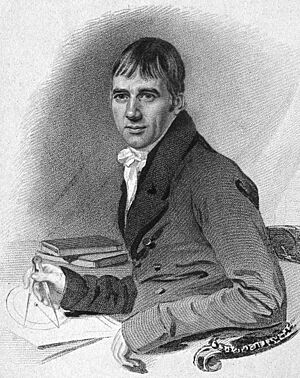Thomas Exley facts for kids
Thomas Exley (born December 9, 1774 – died February 17, 1855) was an English teacher and school owner. He taught mathematics and sometimes wrote books about it. However, he was more famous for his new and sometimes debated ideas in science. He also took part in talks about religion, especially about Methodism.
Exley was born in Gowdall, a small village in Yorkshire, England. He moved to Bristol at the end of 1799 and quickly started teaching math again. In 1812, he helped create a large book called The Imperial Encyclopædia. This book covered science, arts, and other topics. The next year, in 1813, he received an honorary master's degree from King's College, Aberdeen. By 1848, Exley had stopped teaching and retired in Bristol. He was an early member of the British Association for the Advancement of Science, where he shared many of his ideas.
A magazine called The Imperial Magazine wrote about Exley in 1819. He was 44 years old then. The article mentioned that the life of a math teacher who mostly stayed at home might not be full of exciting events. Thomas Exley passed away on February 17, 1855, when he was 80 years old.
Contents
Thomas Exley's Math Work
Thomas Exley showed a strong interest in mathematics from a young age. He went to a school near Barnard Castle that taught both classic subjects and math. Later, he moved to Manchester to study more and find a job. He found both at a new school. This is also how he met the Clarke family. In 1796, he married Hannah Clarke, whose brother was Dr. Adam Clarke.
Exley opened his own school in Huddersfield. Even though it was successful, he had to move again because of his health. This is why he settled in Bristol. His reputation grew there in 1802 when he solved some very difficult math problems that appeared in a local newspaper.
Exley's Contribution to Math
Thomas Exley did not leave behind a huge amount of mathematical work. However, his method for finding cube roots was well-liked. He shared his method in The Imperial Encyclopædia. He also wrote about it again in The Imperial Magazine in 1819. His friend, W. G. Horner, even mentioned Exley's work in his own famous paper about finding roots. Exley and Horner both worked as examiners at Kingswood School in Bristol. Exley examined math, and Horner examined classic subjects.
Thomas Exley's Books
Thomas Exley wrote several books and articles. Here are some of them:
- A Vindication of Dr. Adam Clarke: This book was about religious discussions.
- Reply to Mr. Watson's Remarks: Another book about religious topics.
- The Theory of Parallel Lines perfected: This book was about geometry and tried to prove Euclid's Elements's twelfth rule.
- A new, easy, and very concise rule for extracting the cube root of numbers: An article in Imperial Magazine about his math method.
- Principles of Natural Philosophy: This book shared his new ideas about physics. It talked about how gravity explains the properties of matter.
- Physical Optics: This book explained how light works using his ideas about mechanical science and gravity.
- A Commentary on the First Chapter of Genesis: In this book, he tried to explain the first chapter of the Bible. He also included a short section on Geology and the Deluge (the Great Flood). He said he had been thinking about this book for over forty years.
John Thompson Exley
Thomas Exley had a son named John Thompson Exley (1815–1899) from his second marriage. John went to St. John's College, Cambridge in 1834. He did very well in math and was ranked twenty-third in the Mathematical Tripos in 1838.
John Thompson Exley taught at Bristol College for a short time. He was the Vice-Principal there from 1840 to 1841 before the college closed. After that, he ran a large school for boys in Bristol. When he passed away, the big collection of books that both he and his father had gathered went to the new University College. Today, these books form the main part of the Exley Collection at the University of Bristol. A special item in this collection is John Exley's own math notebook from his time at university.
Sources
- (unsigned) Memoir of Mr. Thomas Exley, A. M. of Bristol. (With a Portrait), Imperial Magazine, 1 (1819), No. 6, Cols. 577–584.
![]() This article incorporates text from a publication now in the public domain: "Exley, Thomas". Dictionary of National Biography. (1885–1900). London: Smith, Elder & Co.
This article incorporates text from a publication now in the public domain: "Exley, Thomas". Dictionary of National Biography. (1885–1900). London: Smith, Elder & Co.
 | Valerie Thomas |
 | Frederick McKinley Jones |
 | George Edward Alcorn Jr. |
 | Thomas Mensah |


